20 Jul 2017
By Belle
Introducing custom tracking (and how we're using it)

Update: custom tracking is now live! Learn more about how to start using this feature or read on for examples of how it's most useful.
Soon we'll be releasing an exciting new feature in Exist: custom tracking. This feature (or something like it) has been highly requested for a while now, and we hope it'll satisfy the needs of our users who want to track data that we can't get into Exist through integrations.
With custom tracking, you can create a tag for anything you want to track, using words to describe it. It might be "headache", for instance, or "coffee", or "floss".
Josh and I have been testing custom tracking for a while now, and our beta testers have had it for a while too, so we wanted to share some of the tags we're using and the types of things you might want to track. These examples are a mixture of actual tags Josh or I have tracked, and tags we've made up to further illustrate how you might use this feature in different ways.
Habits
I've used lots of habit tracking apps in the past, but I always wondered what other factors contributed to me completing (or not completing) my habits each day. With custom tags for my habits, I can combine my habit tracking with the power of Exist's data analysis to figure out how to be more successful with my habits and what's most likely to cause me to skip them.
Examples: piano floss french meditation reading guitar
Piano practice is a daily habit I'm working on at the moment, and I've found this correlation after tracking which days I practise:
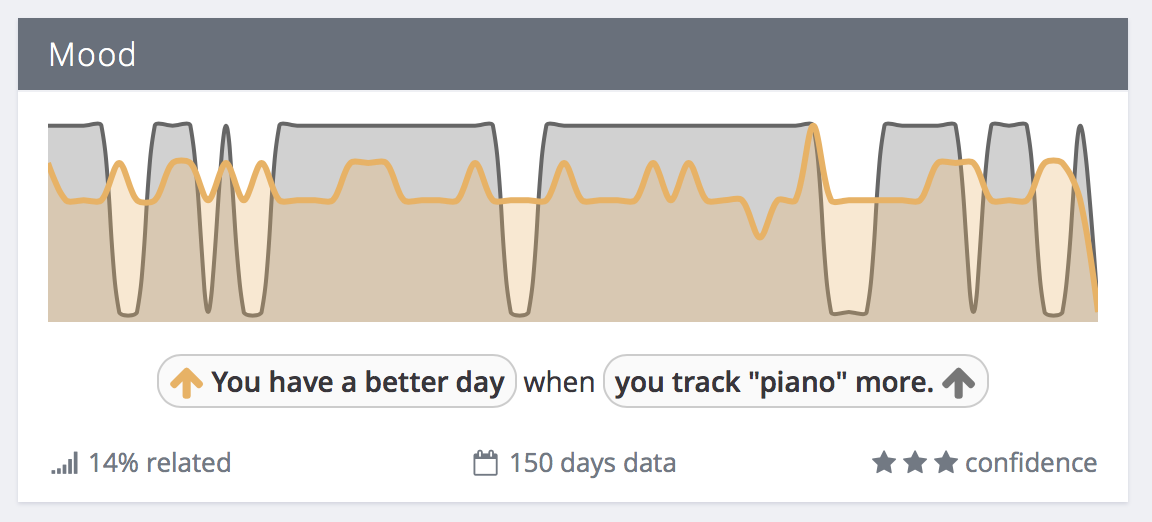
This could mean that practising piano makes me feel good, or that I'm more likely to follow-through on my daily habits when I'm in a good mood.
I've also found that playing piano correlates to not going out for brunch or going to the theatre, so it's obvious I find it harder to fit in on days when I leave the house for an event.
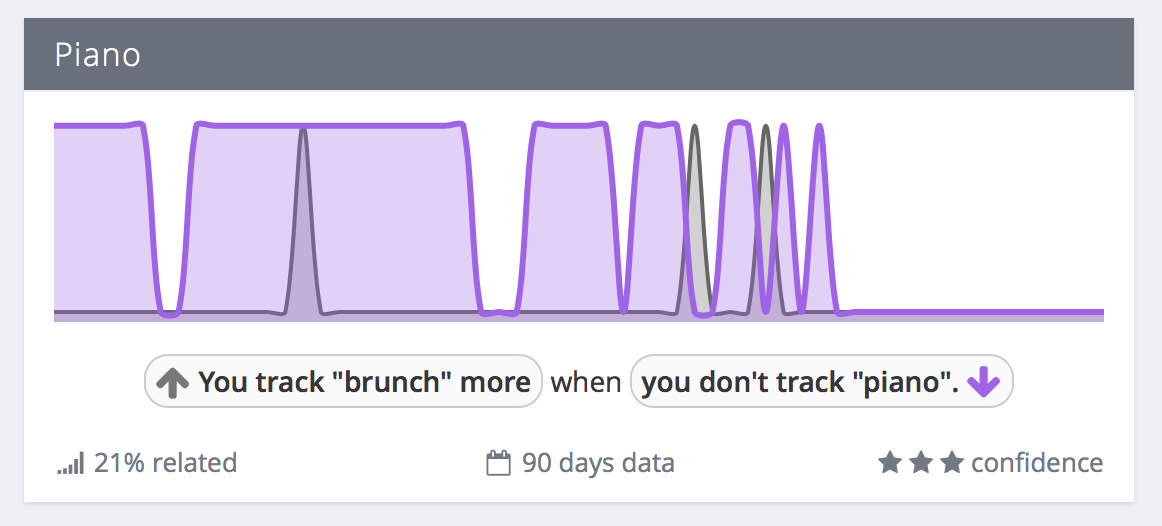
In future I'll need to find a time of day when I can prioritise piano and make sure I get it done regardless of whether I'm going out or not. Without those correlations, I'd have no idea that even going out to the theatre at night makes me less likely to practise piano in the mornings!
Health
If you're managing a chronic condition, custom tracking can help you track anything that's meaningful to you. Maybe it's specific types of pain, changes in your body, or other symptoms specific to your condition. These kind of tags can be useful for anyone battling an occasional illness, as well, or for monitoring more general health-related events such as menstruation or allergy symptoms.
Examples: headache back pain sore throat sneezing migraine period cramps
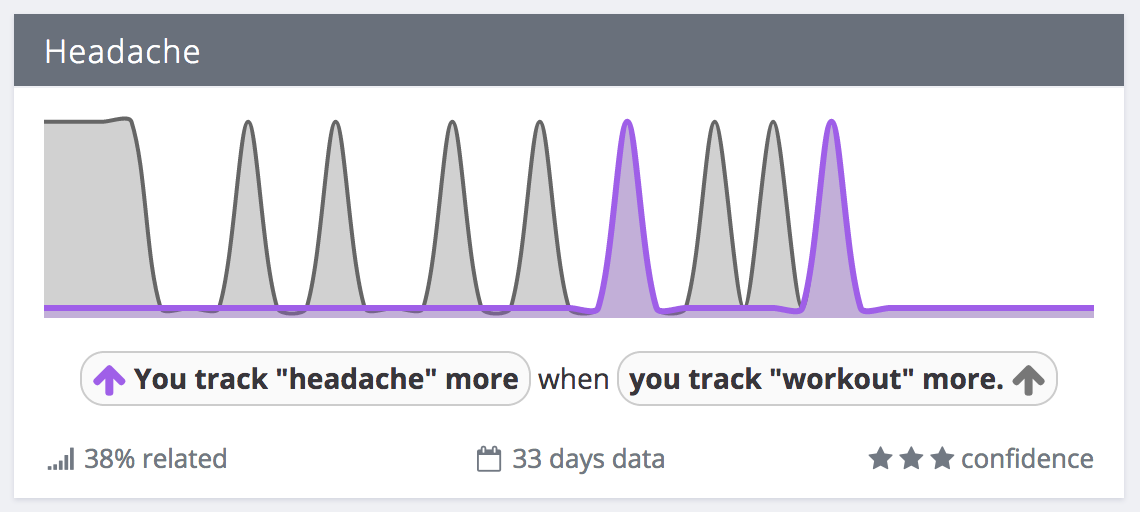
I only get headaches occasionally, but they can be quite painful, so I started tracking them to see if I could figure out a common cause. One thing I didn't expect was how clear a correlation there was that I was completely missing. It turns out I'm much more likely to get a headache on days I work out. My guess is this comes from a terrible effort at rehydration after exercise, causing a headache from dehydration.
Because I don't get a headache immediately after exercising, I hadn't picked up on the connection, but now that the correlation is so clear, I need to really watch my effort to drink liquids during and after workouts.
Events
Although Exist already integrates with calendars to track how many events you have each day and how long you spend in events, you might want to track a particular type of event such as going to the theatre, the doctor, or out to brunch. Or you might want to track the kind of "events" you don't include on your calendar, such as days you work from home, visiting the city if you live in the suburbs normally, or just going to the movies.
Examples: brunch city eating out doctor theatre gig work from home cinema dentistclubbing
Food and drink
Exist integrates with nutrition tracking from Apple Health, Fitbit, and Jawbone UP. Even if you use a specialised app for food tracking, such as MyFitnessPal, you should be able to sync that data to Exist via one of these integrations.
But food tracking is a massive pain. Custom tracking can be helpful for keeping track of specific types of food and drinks that might affect other parts of your life, without having to track everything you eat all day long.
Examples: coffee two coffees wine fast food takeaway spicy food beer alcohol protein shake fasting gluten
Now here's a correlation I actually expected to see, though it took some time to show up. I started tracking "sore belly" to cover any time I had an actual sore belly, but also times when my tummy just seemed upset, if not sore. This happens irregularly, so I've never figured out if there's a particular type of food that my body doesn't seem to like.
I also track "spicy food", which I have very rarely, as I'm not a big fan. I was curious about whether this would correlate with "sore belly". I also track a few other food related tags like "fast food" and "coffee", but it turns out I was spot-on with my spicy food = upset tummy guess. It's never been an obvious correlation to me in real life, but the data doesn't lie.
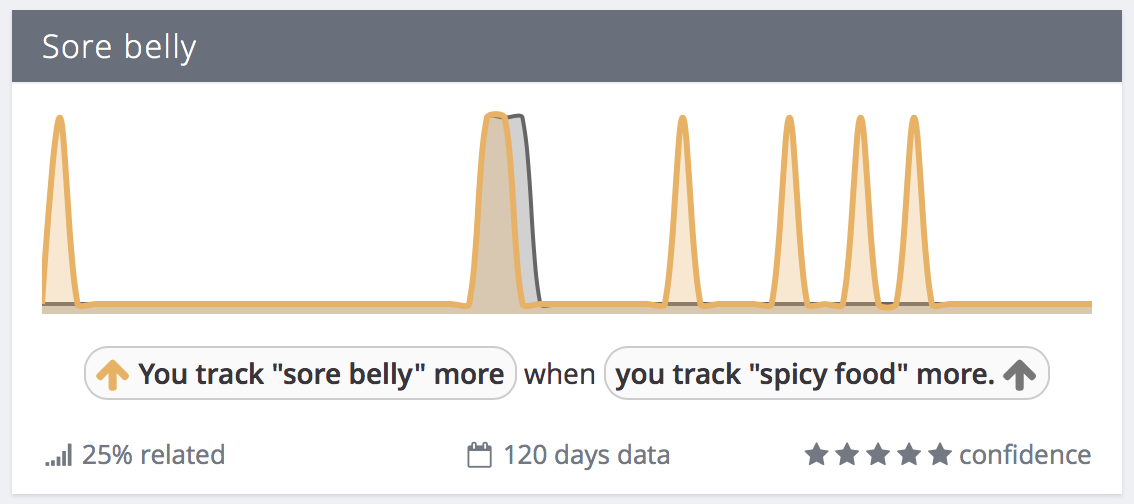
It turns out I'm much more likely to have either an upset stomach or stomach pain on the days I eat spicy food. I already eat spicy food rarely, but I'll probably think twice before I plan to have some next time.
Another interesting one I have from this category is my "two coffees" tag. It's pretty rare for me to have more than one coffee, so I was curious about how that extra caffeine affects me. Perhaps unsurprisingly, I tend to have lots of energy on days I have a second coffee:
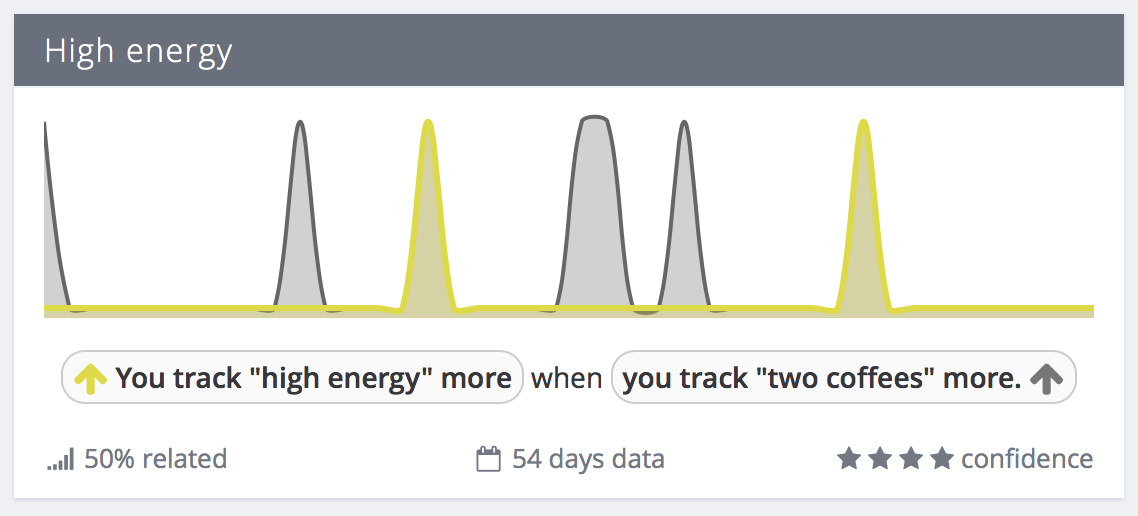
But I was also surprised to find this strong correlation:
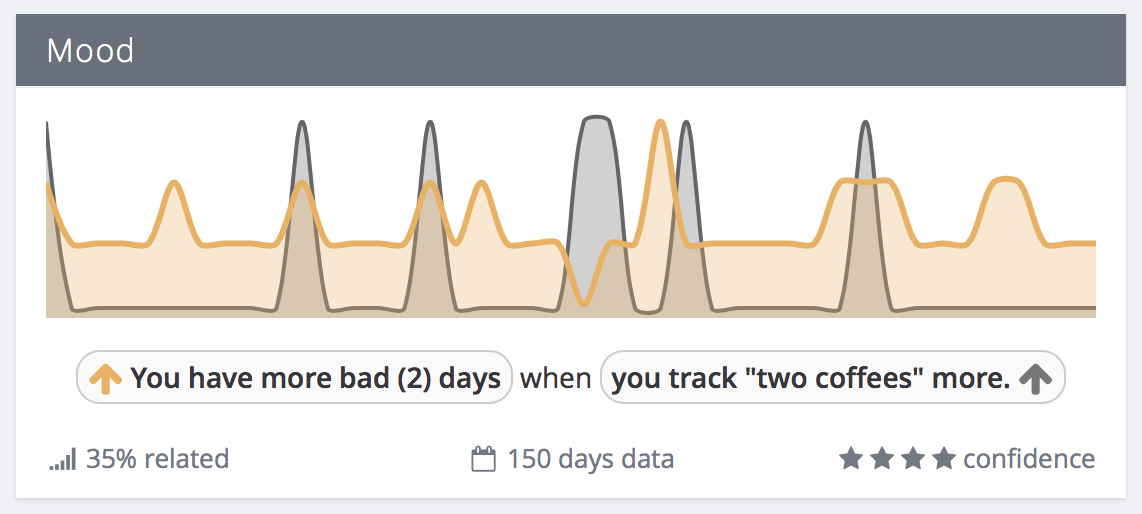
Now, it's possible that I'm more likely to have a second coffee on days that are already feeling bad by mid-morning. But it's also possible that something about having that second coffee sets me up to feel bad by the end of the day. I'm still figuring out which way the causation goes for this one, but I'm now very wary of having a second coffee if I don't really need one.
Activities
There are some activities that aren't exactly habits I'm trying to build, but more things I do occasionally, when needed. I'd like to track these to get a better idea of when I do them most, and how they affect the rest of my life.
Examples: shopping workout weights nap bike ride sex walk driving vacuum study
Here's an example of an activity-related correlation I've found:
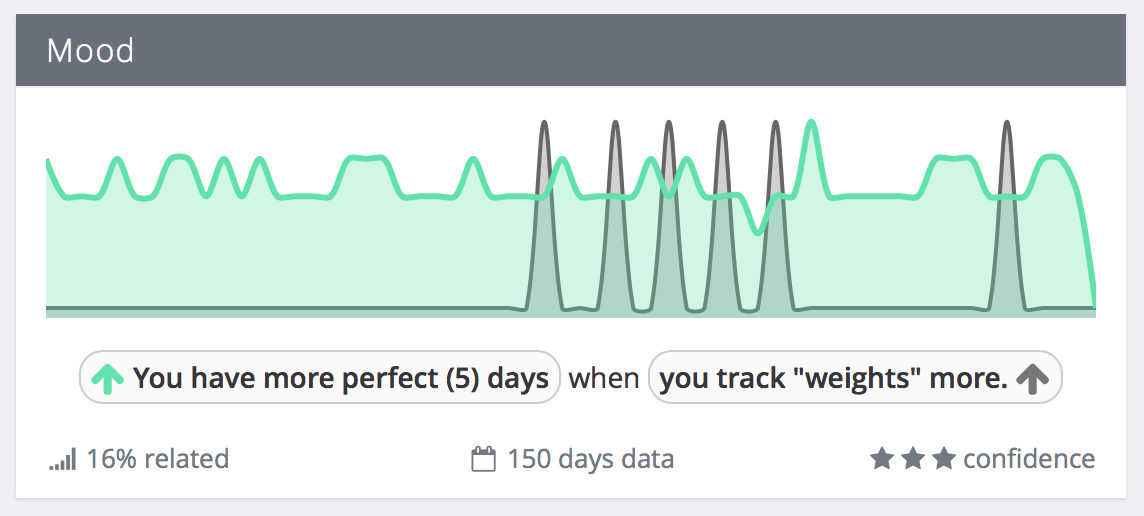
I had no idea whether working out using weights had any affect on the rest of my day, but it turns out I'm far more likely to rate my day 5/5 if I lifted weights that morning. This is worth remembering on those days when I just can't be bothered working out in the morning. Knowing I'm lifting my mood—and that lift will last until bedtime, when I rate my day—might just be the boost of motivation I need.
Medications
If you take different medications on different days, or you take medications only when you have particular symptoms, tracking them can help you keep an eye on when you take them, how often you take them, and how they affect other parts of your life. Or, if you need to take medications regularly, you could track them as you would a habit like flossing, in order to make sure you do this every day.
Examples: vitamin name nootropic medication name
Feelings
Exist has had a mood tracking feature since very early in its life, and we do some analysis on the note you can write about each day to tell you which words you mention most for each of the daily scores from 1–5. But custom tracking is a perfect opportunity to more formally track different emotions.
Examples: tired nauseous high energy low energy bad sleep anxious stressed anti-social grumpy
Bad sleep is a tag Josh uses for those nights that are just rotten, and make you want to write-off the next day. He doesn't always agree with how well his Fitbit says he slept, so this adds an extra data point to help figure out what causes bad sleep and how bad sleep affects other parts of Josh's life. He's found that, unsurprisingly, when he tracks "bad sleep" he has a worse day, is less productive, and also less likely to do other fun things. It really does write off his next day.
I hope these examples have inspired you about all the different ways you'll be able to use custom tags to track your life!
Want to track habits, health symptoms, hobbies, and emotions all in one place? Let Exist do the work of figuring out what makes you complete or skip your habits, what improves your mood, and how your actions affect the rest of your life. Try Exist free for 30 days